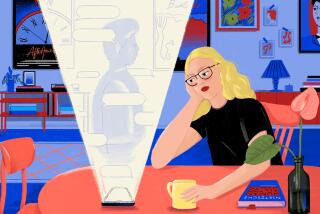Separated by years and oceans, pen pals reconnect
Laurie Tragen-Boykoff rocks on her feet, holding on to a large sign, her hands trembling. The international arrivals ramp at LAX is empty, but that only fuels her anticipation. She’s waited 25 years for this.
On the sign is a blown-up black-and-white photograph of a somber-faced boy. His name is Nicky Mutoka. Below, in large black letters, the Agoura Hills social worker has written: “NICKY!!! I’M LAURIE.” She lifts the sign, her face disappearing behind it. But she is smiling.
In 1987, she began what she saw as a most unlikely pen pal correspondence. Laurie, then 30, was watching television one day and was unexpectedly moved by a plea from actress Sally Struthers in a donor campaign for Christian Children’s Fund, a relief group providing assistance to children in developing countries.
For $21 a month, she could pay for a child’s education, make sure he or she always had enough to eat and get regular progress reports.
Soon she was matched up with Nicky, an 8-year-old from Zambia. But she decided she wouldn’t merely send the monthly check. Instead, they also would write to each other. She insisted on it. Their connection would be her “mitzvah” — a kindness to another.
For eight years, they traded letters. Every month or so, Laurie sent letters and photographs of her husband, Terry, and her growing family, first a son, Loren, and later a daughter, Megan. Nicky also sent snapshots, one showing him with his brothers and father on the small piece of land his family farmed in rural Zambia. Another showed his sister and mother.
His letters sometimes were decorated by drawings with lines and colors that made them unmistakably a child’s — one of his grandfather’s thatched-hut village and another of a giraffe munching leaves from a tree.
Laurie carefully placed each correspondence in a growing manila folder on her nightstand.
She urged Nicky to do well in school and promised that, no matter what, she would stay in touch. Nicky promised the same. “I know that God knows the day when we are going to greet each other ... not in letters,” he wrote. The manila folder was 3 inches thick when they lost contact.
::
Deciding its work there was done, Christian Children’s Fund pulled out of Nicky’s village and moved on to another. Because its rules prevented addresses from being exchanged, the letters stopped. And that was that.
The charity, now known as Child Fund International, has never allowed sponsors to connect directly with the children, said Cynthia Price, a spokeswoman. Even today, in a digital world, sponsors are asked not to connect via the Internet. All correspondence goes through Child Fund.
The policies protect both sides, Price said. Sponsors can fall prey to scams in third-world countries, and children can become unsuspecting targets of pedophiles. Donors who want to know more about the boy or girl they sponsor have to do it the old-fashioned way — by becoming pen pals.
“We want to ensure that information written to a child is appropriate,” Price said.
As the years passed and even as the ways of communicating changed, Laurie was resigned to not hearing from her friend. She didn’t use Facebook, didn’t like it. She didn’t tweet. She still calls herself “technically deficient” with zero interest in the world of social media.
Laurie kept busy with events at her temple and with her work helping mentally and developmentally disabled adults. Life moved on. Her daughter Megan went to college and son Loren was dabbling in website design. The family moved from Encino to a large two-story home in Agoura Hills.
But she still thought of Nicky whenever she glanced at the manila folder still at her bedside. She couldn’t bring herself to get rid of it. Nicky never stopped thinking of her, either.
Zambia is a country of stunning natural beauty but widespread poverty. His family scratched out a living growing corn, nuts and sweet potatoes in the tropical savanna surrounding Lusaka, the country’s capital. He remembers how Laurie’s letters and checks were eagerly awaited each month.
The money sent him to school and bought food and a few luxuries such as soap. It helped pay for doctor visits and medicine for his father, who had crippling arthritis. Of five siblings, Nicky was the most academically gifted. He was determined to finish high school, he says, even after losing his pen pal.
He was undeterred by the Children’s Fund refusal to give him Laurie’s address. He sent two letters to an address he thought was hers. They came back, unopened.
Still, he managed to finish high school. Determined to raise money for college, Nicky went to work. For two years, he mined copper, escaping two collapses that killed other workers. After that he worked in a margarine factory where gases from the manufacturing process were so flammable that workers could be arrested just for possessing a matchstick, he said. That was followed by a job riding a motor scooter around the busy streets of Lusaka, delivering scratch-off phone cards.
Through it all, he said, he never forgot his American “second mum.”
He remembers going to the U.S. Embassy to track her down, but workers there couldn’t help.
“They said, ‘Oh no — America’s a big place,’” Nicky recalled.
His years of scrimping paid off, though. He managed to put himself through college, graduating with a degree in business from Evelyn Hone College in Lusaka. After working for a time on commission for Barclays bank, he landed his dream job as a salaried account salesman two years ago. He was a success.
But he still had a promise to fulfill.
So on a chilly day in January 2011, he walked into an Internet cafe and logged on to Facebook.
In the search box, he typed the name “Boykoff.” The first name that popped up was Megan Boykoff, a 19-year-old student at Fullerton College.
He sent her a message: “hi Megan, i thank God for facebook. am so convinced you must be from the family i have been looking for over 12 years or so now. my name is Nicky Mutoka from Zambia in Africa.”
Megan didn’t know what to make of it. But she knew who might.
Laurie was standing in line at a Starbucks when her daughter called.”She said, ‘Did you ever know a boy named Nicky from Zambia?”’ Laurie recalled. “And my heart just stopped.”
Over the next several months, the onetime pen pals exchanged emails and phone calls. Nicky, now 32, always made a point of thanking her for all that she had done for him and saying he couldn’t have succeeded without her.
He confided that he’d kept several photographs and never allowed anyone else to touch them.
“i always knew i had a second family in California,” he wrote in one of their weekly email exchanges.
Laurie considered the emails a gift. Last fall, she and her husband decided that one gift deserved another: They would bring Nicky and his new wife, Ketty, five months pregnant with their first child, to California for a real visit this spring.
::
Passengers begin trickling into the arrival area, pushing big suitcases on rolling racks. Laurie is rocking and shaking, scanning each face, so full of energy that she can’t even talk to her family waiting with her.
“I have honestly never seen her so on edge,” her daughter said later. “She’s always an excited and passionate woman, but she was on a whole other level that day.”
Finally she sees the boy, now a man, with Ketty on his arm, and does the only thing she can think of doing.
She screams.
Then she throws down her sign and rushes toward the young couple. They embrace, and stay that way for a while. Laurie screams again and they finally pull apart. Nicky pulls out a white handkerchief and wipes his eyes.
“Oh my God! Wow!” he says. “Thank you, mum. Thank you.”
The two families walk off, arm in arm, anxious to close the years and the distance.
Over the days, there are trips to Disneyland, Hollywood and the boardwalk at Venice Beach. One night, Nicky holds an audience rapt at Laurie’s temple, telling his story.
As the visit draws to a close, he reflects on the woman who lived 10,000 miles away, the woman whose kindness put him on a different path in life.
“I’ve failed to find words more appropriate than ‘thank you,’” he says.
For Laurie, new memories may be the best thanks. She’s started a new folder. On her computer.
catherine.saillant@latimes.com
More to Read
Sign up for Essential California
The most important California stories and recommendations in your inbox every morning.
You may occasionally receive promotional content from the Los Angeles Times.











